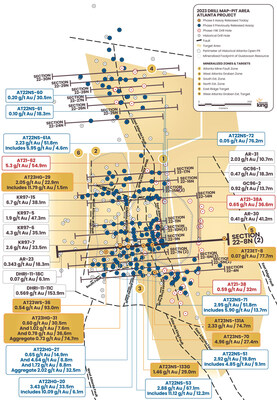NEVADA KING INTERCEPTS 4.96 G/T AU OVER 27.4M AND 2.33 G/T OVER 74.7M FURTHER DEFINING HIGH-GRADE MINERALIZATION ACROSS THE ATLANTA MINE FAULT ZONE AND THE WEST ATLANTA GRABEN ZONE
- Nevada King Gold Corp. announced positive assay results from its Atlanta Gold Mine Project, including 4.96 g/t Au over 27.4m in hole AT23NS-70 and 2.33 g/t Au over 74.7m in hole AT23NS-131A.
- The in-fill drilling along the Atlanta Mine Fault Zone is helping to better define structural controls and constraints on mineralization, which could significantly add to the overall resource.
- The presence of mineralization within the West Atlanta Graben Zone confirms the continuity of mineralization in this area and opens up new exploration opportunities.
- The company is preparing to drill the 115m gap between two holes in anticipation of encountering higher-grade mineralization closer to the West Atlanta Fault #2.
- The ongoing drilling on the South Quartzite Ridge Target could lead to the discovery of new mineralized zones in unexplored areas of the property.
- None.
Insights
Analyzing...
Hole No. | From (m) | To (m) | Interval (m) | Au (g/t) | Ag (g/t) | Notes |
AT23NS-70 | 80.8 | 108.2 | 27.4 | 4.96 | 49.3 | |
AT23NS-131A* | 118.9 | 193.6 | 74.7 | 2.33 | 23.9 | Bottomed in Mineralization |
AT23HG-29 | 286.6 | 309.5 | 22.9 | 2.05 | 31.9 | |
Includes | 303.4 | 304.9 | 1.5 | 11.79 | 65.0 | |
AT23HG-31 | 176.8 | 207.3 | 30.5 | 0.60 | -0.5 | |
And | 237.8 | 245.4 | 7.6 | 1.02 | 95.5 | |
And | 257.6 | 294.2 | 36.6 | 0.78 | 26.4 | |
Aggregate | 176.8 | 294.2 | 74.7 | 0.73 | 22.7 | |
AT23WS-36 | 242.4 | 335.4 | 93.0 | 0.54 | 7.6 |
Table 1. Highlight holes released today. Mineralization occurs along near-horizontal horizons with true mineralized |
- 4.96 g/t Au over 27.4m in AT23NS-70 is hosted within silicified breccia and adjacent porphyritic rhyolitic breccia dikes/sills. Mineralizing fluids are interpreted to have channeled upward through the Paleozoic quartzite and dolomite into the silica breccia horizon at the Tertiary-age unconformity which hosts much of the mineralization at
Atlanta (see Figure 2). - Higher Au-Ag grades are frequently found in the silica breccia proximal to these tuff dikes further north and south along the
Atlanta King Fault ("AKF"). The higher grade in AT23NS-70 relative to adjacent holes illustrates the importance of drill-testing structural feeders, while the location, dip, and displacement on the AKF are now firmly established in this portion of the resource zone. - 2.33 g/t Au over 74.7m in angle hole AT23NS-131A adds better definition to the fault displacement and top of the mineralized zone within the 25m-wide high grade wedge that occurs along the west side of the East Atlanta Fault. Gold grade appears to be uniformly distributed within this structural wedge, although holes drilled closer to the East Atlanta Fault, such as previously released vertical hole AT21-62 (54.9m @ 5.3 g/t Au) do exhibit higher grade where interesecting major feeder structures.
- Holes AT23HG-31 (74.7m @ 0.73 g/t Au), AT23HG-29 (22.9m @ 2.05 g/t Au), and AT23WS-36 (93m @ 0.54 g/t Au) stepped westward from the WAF into the middle of the WAGZ where grade progressively decreases westward. However, as shown in Figure 2, historical core hole DRHI-11-11C (153.9m @ 0.57 g/t Au) was drilled west of the West Atlanta Fault #2 ("WAF2"), which bounds the western margin of the WAGZ, and intersected a very long mineralized interval at a grade very close to that in AT23WS-36. There is a good possibility that the thick mineralization in DRHI-11-11C was sourced from the WAF2, so pads are currently being prepared to drill the 115m gap separating these two holes in anticipation of encountering higher grade closer to the WAF2.
Cal Herron, Exploration Manager of
Hole No. | From (m) | To (m) | Interval (m) | Au (g/t) | Ag (g/t) | Notes |
AT23WS-36 | 242.4 | 335.4 | 93.0 | 0.54 | 7.6 | |
AT23HG-29 | 286.6 | 309.5 | 22.9 | 2.05 | 31.9 | |
Includes | 303.4 | 304.9 | 1.5 | 11.79 | 65.0 | |
AT23HG-31 | 176.8 | 207.3 | 30.5 | 0.60 | -0.5 | |
And | 237.8 | 245.4 | 7.6 | 1.02 | 95.5 | |
And | 257.6 | 294.2 | 36.6 | 0.78 | 26.4 | |
Aggregate | 176.8 | 294.2 | 74.7 | 0.73 | 22.7 | |
AT23NS-70 | 80.8 | 108.2 | 27.4 | 4.96 | 49.3 | |
AT23NS-131A* | 118.9 | 193.6 | 74.7 | 2.33 | 23.9 | Bottomed in Mineralization |
AT23NS-133G | 97.6 | 126.5 | 29.0 | 1.46 | 23.9 | |
AT23ET-8 | 0.0 | 77.7 | 77.7 | <0.07 | <0.5 |
Table 2. All |
Hole No. | From (m) | To (m) | Interval (m) | Au (g/t) | Ag (g/t) | Notes |
AT22HG-2T | 176.8 | 191.8 | 14.9 | 0.65 | <0.5 | |
and | 232.9 | 241.8 | 8.8 | 4.64 | 154.1 | |
and | 256.1 | 264.9 | 8.8 | 1.72 | 40.4 | Bottomed in Mineralization |
Aggregate | 176.8 | 264.9 | 32.5 | 2.02 | 82.1 | |
AT22HG-20 | 207.3 | 240.9 | 33.5 | 3.43 | 125.7 | |
includes | 233.2 | 239.3 | 6.1 | 10.09 | 284 | |
AT22NS-53 | 157.0 | 224.1 | 67.1 | 2.88 | 52.0 | |
includes | 205.8 | 218.0 | 12.2 | 11.12 | 122.1 | |
AT22NS-51 | 89.9 | 109.8 | 19.8 | 2.92 | 61.5 | |
includes | 93.0 | 102.1 | 9.1 | 4.85 | 96.2 | |
AT22NS-71 | 36.6 | 88.4 | 51.8 | 2.95 | 79.5 | |
includes | 54.9 | 68.6 | 13.7 | 5.90 | 164 | |
AT22NS-60 | 0.0 | 30.5 | 30.5 | <0.20 | <0.5 | |
AT22NS-61 | 0.0 | 18.3 | 18.3 | <0.10 | <0.5 | |
AT22NS-61A* | 6.1 | 57.9 | 51.8 | 2.23 | 59 | Bottomed in Mineralization |
includes | 22.9 | 27.4 | 4.6 | 5.95 | 20.1 | |
AT22NS-72 | 0.0 | 76.2 | 76.2 | <0.05 | <0.5 | |
AT21-062 | 9.1 | 68.6 | 54.9 | 5.34 | 27.3 | |
AT21-038 | 0.0 | 32.0 | 32 | 0.59 | 16.7 | |
AT21-038A* | 0.0 | 36.6 | 36.6 | 0.65 | 10.9 |
Table 3. All |
Hole No. | From | To (m) | Interval (m) | Au (g/t) | Ag (g/t) |
DHRI-11-18C+ | 257.6 | 263.7 | 6.1 | 0.07 | 7.8 |
DHRI-11-11C+ | 266.8 | 420.7 | 153.9 | 0.569 | 17.4 |
KR97-7* | 211.9 | 245.4 | 33.5 | 2.6 | 59.6 |
KR97-6* | 179.9 | 214.9 | 35.1 | 4.3 | 61.8 |
KR97-5* | 164.6 | 211.9 | 47.3 | 1.9 | 43.3 |
KR97-15* | 152.4 | 190.5 | 38.1 | 6.7 | 52.8 |
GC96-1* | 0 | 18.3 | 18.3 | 0.47 | 3.5 |
GC96-2* | 0 | 13.7 | 13.7 | 0.92 | 3.7 |
AR-30 | 0 | 41.2 | 41.2 | 0.41 | 13.4 |
AR-31* | 0 | 10.7 | 10.7 | 2.03 | 12.1 |
AR-23 | 0 | 18.3 | 18.3 | 0.343 | 15.6 |
Table 4. Historical holes used in Section 22-8N(2). Mineralization occurs along near-horizontal horizons with true |
All RC samples from the Atlanta Project are split at the drill site and placed in cloth and plastic bags utilizing a nominal 2kg sample weight. CRF standards, blanks, and duplicates are inserted into the sample stream on-site on a one-in-twenty sample basis, meaning all three inserts are included in each 20-sample group. Samples are shipped by a local contractor in large sample shipping crates directly to American Assay Lab in
The scientific and technical information in this news release has been reviewed and approved by Calvin R. Herron, P.Geo., who is a Qualified Person as defined by National Instrument 43-101 ("NI 43-101").
The Atlanta Mine is a historical gold-silver producer with a NI 43-101 compliant pit-constrained resource of 460,000 oz Au in the measured and indicated category (11.0M tonnes at 1.3 g/t) plus an inferred resource of 142,000 oz Au (5.3M tonnes at 0.83 g/t). See the NI 43-101 Technical Report on Resources titled "Atlanta Property,
Resource Category | Tonnes (000s) | Au Grade (ppm) | Contained Au | Ag Grade (ppm) | Contained Ag |
Measured | 4,130 | 1.51 | 200,000 | 14.0 | 1,860,000 |
Indicated | 6,910 | 1.17 | 260,000 | 10.6 | 2,360,000 |
Measured + Indicated | 11,000 | 1.30 | 460,000 | 11.9 | 4,220,000 |
Inferred | 5,310 | 0.83 | 142,000 | 7.3 | 1,240,000 |
Table 5. NI 43-101 Mineral Resources at the Atlanta Mine |
Please see the Company's website at www.nevadaking.ca.
Neither the TSX Venture Exchange nor its Regulation Services Provider (as that term is defined in the policies of the TSX Venture Exchange) accepts responsibility for the adequacy or accuracy of this release.
This news release contains certain "forward-looking information" and "forward-looking statements" (collectively "forward-looking statements") within the meaning of applicable securities legislation. All statements, other than statements of historical fact, included herein, without limitation, statements relating the future operations and activities of
![]() View original content to download multimedia:https://www.prnewswire.com/news-releases/nevada-king-intercepts-4-96-gt-au-over-27-4m-and-2-33-gt-over-74-7m-further-defining-high-grade-mineralization-across-the-atlanta-mine-fault-zone-and-the-west-atlanta-graben-zone-301971177.html
View original content to download multimedia:https://www.prnewswire.com/news-releases/nevada-king-intercepts-4-96-gt-au-over-27-4m-and-2-33-gt-over-74-7m-further-defining-high-grade-mineralization-across-the-atlanta-mine-fault-zone-and-the-west-atlanta-graben-zone-301971177.html
SOURCE Nevada King Gold Corp.










